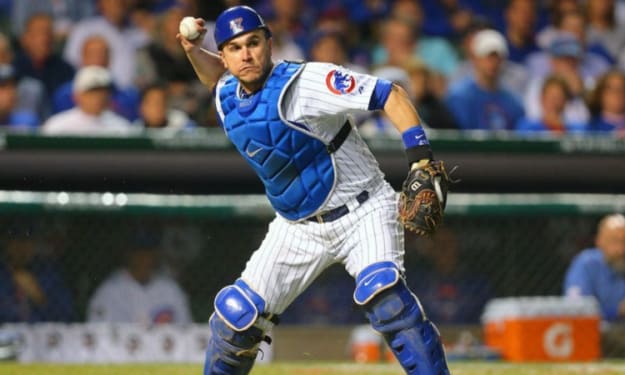Optimizing the WBC
Let’s work to make the WBC better

The World Baseball Classic is having one of its best tournaments ever. From surprise contender Israel to dramatic extra-inning victories, with a healthy bit of rules drama sprinkled in for good measure, there’s been no shortage of entertainment. And as a dedicated baseball fan, I’ve been following almost every game (hey, it beats fake baseball where shit like this happens).
In spite of all the headlines, the most fascinating thing about the WBC (for me, at least) is the format — the rules and setup of the WBC drastically differ from the traditional MLB season, or even from the postseason. There are a number of quirks and strange rules that I feel could be easily exploited. So, I present to you my proposal for an über-optimized WBC team, one that takes advantage of all the rule sets. Here’s what it would look like:
Pitchers who don’t work the count
Pitch counts in the WBC are everything. Pitchers can only throw so many pitches in a game in a given round — otherwise, the rules mandate that they be taken out. It’s especially low for the first round — the maximum counts have hovered between 60 and 65 in years past — and as a result, plenty of relievers are a MUST in the WBC.
So how do you work around pitch limits? By having efficient pitchers. If our theoretical team minimizes the pitch count, starters can go deeper into games, saving our relief options for a rainy day or for when they’re needed. By allowing for greater flexibility, the manager of the team will have more options.
This rules out a few pitchers who we might otherwise want on our team — guys like Noah Syndergaard, Max Scherzer, and Justin Verlander are all fantastic pitchers, but they generally take far more pitches than average to end a PA (those mentioned above hover around 4 P/PA). That’s just the nature of their approach on the mound — as strikeout pitchers, they’re focused on working the count, which requires more pitches.
But there are some intriguing candidates who are definitely deserving of a slot. Aaron Sanchez, the AL ERA leader in 2016, pitched to a 3.69 P/PA figure. Corey Kluber, Carlos Martinez, and Johnny Cueto all saw P/PAs of around 3.7. They’re not racking up strikeouts like it’s The Show ’17, but they’re effective at balancing strikeouts and ground-ball pitching to work as efficiently as possible.
As a result, our team has top tier pitchers who can go ~10% deeper into games than other elite pitchers. That’s rest for a reliever, and more depth for the rest of the game, and far more flexibility as a manager — a useful advantage to have.
Batters who DO work the count
Conversely, we can also turn a WBC game into a war of attrition. What’s unique about the WBC is that basically every game counts. Losing even a single game could mean that you’re not moving to the next round — much like the MLB Wildcard game. Flashback to last year’s NL WC game…
As a Mets fan, the most frustrating thing about 2016 was watching the Mets be so aggressive during the Wildcard game. It was obvious that Bumgarner was dominating, so the sooner that he was taken out, the better — the Mets could then get to work on the Giants’ lackluster bullpen.
But instead of working the count deep and trying to raise Bumgarner’s pitch count so he’d be taken out, too many Mets were swinging pitch. As a result, Bumgarner threw a CG-SO, and the Mets lost. Had the Mets worked the count, Bumgarner would have been gone before the 8th or 9th, and the Mets would have stood a much better chance of winning.
Let’s take this same logic, of working counts to remove pitchers, and apply it to the WBC. But instead of the manager making the judgment call of when a pitcher is done and giving them flexibility (Bumgarner threw 119 pitches), the rules can decide when to take a pitcher out. For our imaginary team, we can leverage this into kicking pitchers out of games early.
Our imaginary team needs capable hitters who work the count. Examples include: Mike Trout (is there anything he can’t do?), 3rd among qualified batters with a 4.43 P/PA, Josh Donaldson (4.22), and Edwin Encarnacion (4.13). There are other hitters who are better in terms of P/PA, but the advantage gained from working the count deeper than usual doesn’t necessarily mean that we’d want Alex Avila (4.54 P/PA) or Byung Ho-Park (4.27 P/PA).
We don’t necessarily need batters who are good at working the count, however — we just need batters to be less aggressive at the plate. First-pitch swinging may be tempting, and it often works well in the MLB — but in the WBC, it’s the wrong move.
Using Niche Players
Over the course of a full season, it may not make sense to have certain players on your roster. For instance, Eric Young Jr. has had a tough time sticking in the major leagues because of his lackluster bat. The big reason that he’s still playing baseball, however, is his speed — he swiped 46 SB in 2013, and 30 in only 100 games in 2014.
He’s not worth a 40 man roster slot, mostly because his bat isn’t even league average (73 wRC+ — oof). However, he might be worth a slot on our WBC roster as a “designated runner”. Herb Washington famously was brought on as a designated runner to the Athletics in the 70's, but the experiment never really worked because a designated runner doesn’t provide any value elsewhere. In the WBC, when every game matters, it might just be worth it to have a speedster on the bench, even if he can’t hit worth a damn.
Look at the extra innings rules — in the event that a game goes to the 11th inning, teams begin with runners on first and second. Putting a designated runner on 2nd might just win the game, whereas someone slower might cost it.
There are other niche roles to be explored here as well. A designated lefty masher (someone like Wilmer Flores, who posted an eye popping 192 wRC+ against lefties but only 75 wRC+ against righties), defensive substitutions, or something creative that I couldn’t imagine.
Ultimately, the advantage garnered by exploiting these rules are fairly slight. In such a high pressure situation though, where not only every game but every run matters, a team would be wise to take advantage of every edge that they could get.
About the Creator
John Edwards
Staff Writer for The Unbalanced, Contributor at Sporting News.






Comments
There are no comments for this story
Be the first to respond and start the conversation.